
Copyright 2012 by Aaron J. James
All rights reserved. Published in the United States by Doubleday, a division of Random House, Inc., New York, and in Canada by Random House of Canada Limited, Toronto.
www.doubleday.com
DOUBLEDAY and the portrayal of an anchor with a dolphin are registered trademarks of Random House, Inc.
Jacket design by Emily Mahon
Library of Congress Cataloging-in-Publication Data
James, Aaron (Aaron J.)
Assholes : a theory / Aaron James.1st ed.
p. cm.
1. Egoism. 2. Conduct of life. I. Title.
BJ1474.J36 2012
179dc23 2012005659
eISBN: 978-0-385-53568-7
v3.1
To my parents
If an individual takes a lenient view of the moral law, he may well have a high opinion of himself and be conceited, because he judges himself by a false standard.
IMMANUEL KANT , Lectures on Ethics
mile, in considering his rank in the human species and seeing himself so happily placed there, will be tempted to attribute his happiness to his own merit. This is the error most to be feared, because it is the most difficult to destroy.
JEAN-JACQUES ROUSSEAU , mile
Do you know who I am?
A quintessential asshole question
CONTENTS
[] A THEORY
 In the summer of 2010, Stanley McChrystal, U.S. army general and Afghan war commander, reportedly trashed the U.S. civilian military leadership, in effect forcing President Barack Obama to ask him to resign. The display of disrespect was striking, but more telling were the details about McChrystals handling of smaller matters. According to one story, McChrystal was once apprised by his chief of staff that he was obliged to attend a dinner in Paris with NATO alliesif not to shore up flagging support for the war, then simply because, as the chief of staff put it, the dinner comes with the position, sir. McChrystal held up his middle finger, retorting, Does this come with the position?
In the summer of 2010, Stanley McChrystal, U.S. army general and Afghan war commander, reportedly trashed the U.S. civilian military leadership, in effect forcing President Barack Obama to ask him to resign. The display of disrespect was striking, but more telling were the details about McChrystals handling of smaller matters. According to one story, McChrystal was once apprised by his chief of staff that he was obliged to attend a dinner in Paris with NATO alliesif not to shore up flagging support for the war, then simply because, as the chief of staff put it, the dinner comes with the position, sir. McChrystal held up his middle finger, retorting, Does this come with the position?
For brazen disregard, General McChrystal pales in comparison to another general, Douglas MacArthur. During the Korean War, MacArthur was a law unto himself, in matters both big and small. He quarreled defiantly in public with President Truman, agitating for nuclear war. In their eventual confrontation at Wake Island, MacArthur went so far as to arrive first and then order the presidents approaching plane into a holding pattern. MacArthurs commander in chief would thus arrive on the landing strip appearing to be MacArthurs supplicant.
Truman was arguably pulling his punches. He could easily have called MacArthur an asshole.
That would not be an exotic charge: assholes abound in history and public life. Aside from runaway generals, we might think of such contemporary figures as former Italian president Silvio Berlusconi, Venezuelan president Hugo Chavez, or Iranian president Mahmoud Ahmadinejad. We might think of the self-important developer-entertainer Donald Trump, the harsh pop music critic Simon Cowell, or the narcissist actor Mel Gibson. Assholes are found daily on cable news, where hosts repeatedly interrupt their guests, and also on talk radio, where airtime is given to commentators who thrive on falsehood and invective. Even as this demonstrably degrades the public debate so vital for a healthy democratic society, overheated commentators get rich and famous, while clearly having a really great time.
All of this poses a larger philosophical question: What is it for someone to be an asshole? The answer is not obvious, despite the fact that we are often personally stuck dealing with people for whom there is no better name. Assholes can be found not simply in history and high public office but almost anywhereat work; in our chosen club, sport, school, religious group, or circle of friends; and even, for the truly unlucky, in the home or immediate family. Try as we might to avoid them, we often simply have to manage encounters that come, for most of us, with great difficulty and personal strain. The asshole is not just another annoying person but a deeply bothersome personbothersome enough to trigger feelings of powerlessness, fear, or rage. To make matters worse, we may be unable to understand why exactly someone should be so disturbing. We may feel certain only that asshole is a suitably unsavory name for this particular person.
While most of us could use advice in asshole management, we cannot get far without an answer to our initial question: What is it for someone to be an asshole? If nothing else, a good answera good theory of the assholewould be intellectually interesting. It would give us the concepts to finally think or say why some people disturb us so. That, in turn, would ideally open a window into deeper aspects of morality and social life. We would see what assholes reveal about the human social condition and why assholes are everywhere, in every society. Ideally, a good theory would be practically useful. Understanding the asshole we are stuck with might help us think constructively about how best to handle him. We might get a better sense of when the asshole is best resisted and when he is best ignoreda better sense of what is, and what is not, worth fighting for.
The asshole refuses to listen to our legitimate complaints, and so he poses a challenge to the idea that we are each to be recognized as moral equals. This explains why the asshole is so bothersome, by revealing the great importance we attach to recognition in unexpected areas of our lives. In later chapters, we will suggest that a clearer understanding of this helps with asshole management. The key is to understand why we are easily tempted to fight on the assholes terms: we are fighting for moral recognition in his eyes. We will also explore larger, more basic questions about human social life. Why are assholes mainly men? Can assholes be properly blamed? Why do some societies produce more assholes than others? Are certain styles of capitalism especially prone to asshole production and thus social decline? And, finally, can we ultimately make peace not only with the given asshole but also with a human social condition in which assholes flourish?
WHAT IS IT TO BE AN ASSHOLE ?
Our theory is simply this: a person counts as an asshole when, and only when, he systematically allows himself to enjoy special advantages in interpersonal relations out of an entrenched the asshole:
(1) allows himself to enjoy special advantages and does so systematically;
(2) does this out of an entrenched sense of entitlement; and
(3) is immunized by his sense of entitlement against the complaints of other people.
So, for example, the asshole is the person who habitually cuts in line. Or who frequently interrupts in a conversation. Or who weaves in and out of lanes in traffic. Or who persistently emphasizes another persons faults. Or who is extremely sensitive to perceived slights while being oblivious to his crassness with others. An insensitive persona mere jerkmight allow himself to so enjoy special advantages in such interpersonal relations. What distinguishes the asshole is the way he acts, the reasons that motivate him to act in an abusive and arrogant way. The asshole acts out of a firm sense that


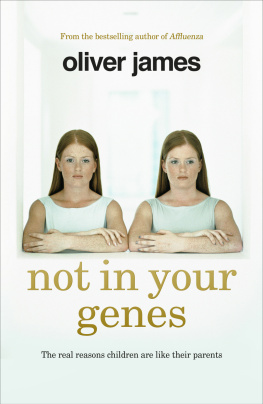





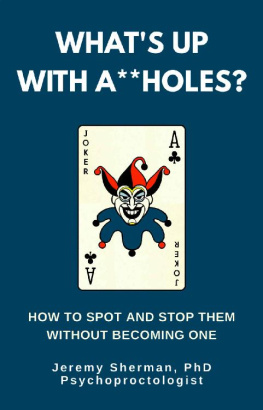
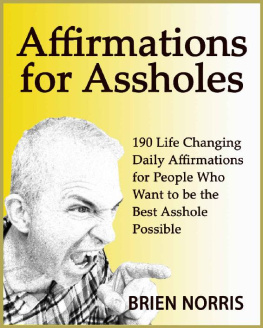
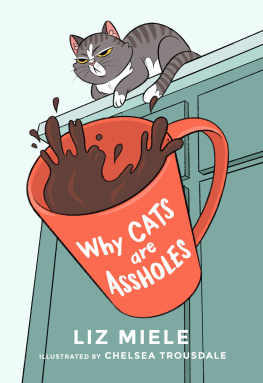
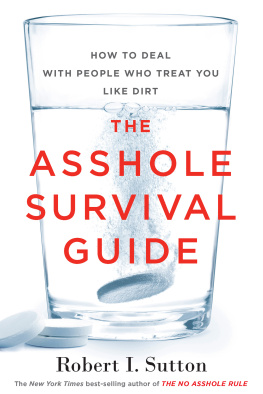
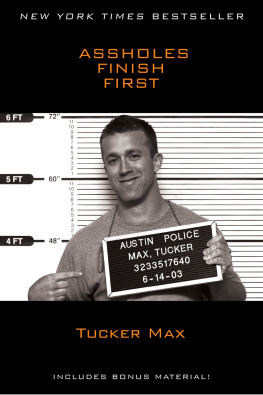
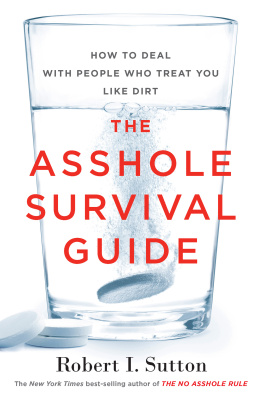
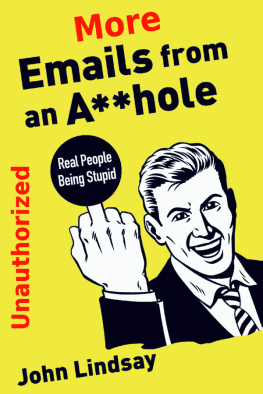

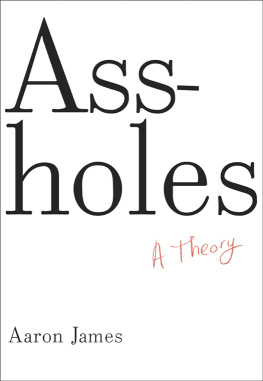
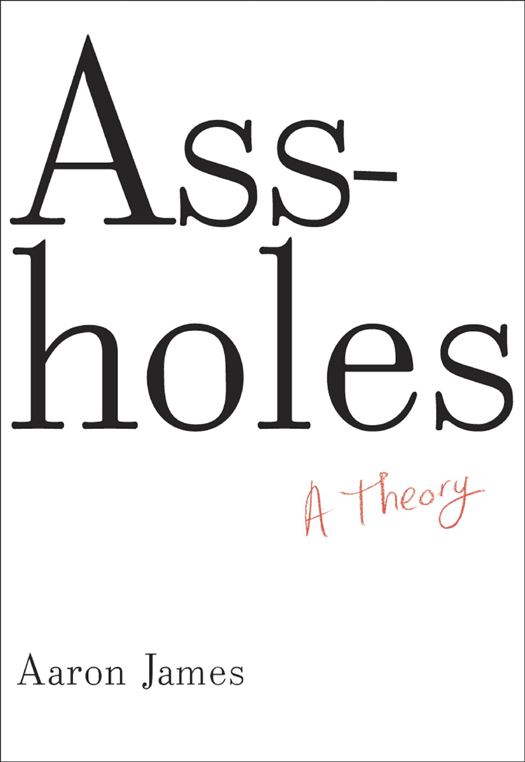
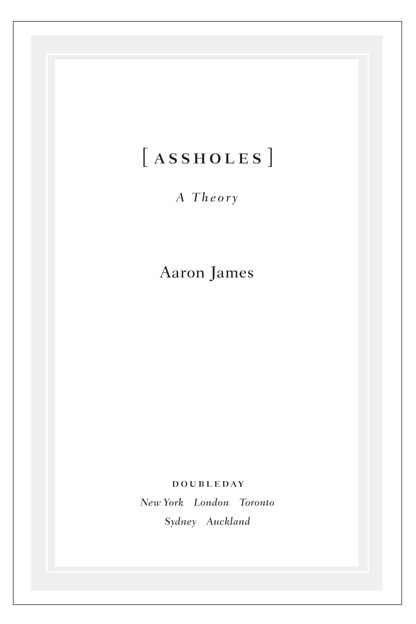

 In the summer of 2010, Stanley McChrystal, U.S. army general and Afghan war commander, reportedly trashed the U.S. civilian military leadership, in effect forcing President Barack Obama to ask him to resign. The display of disrespect was striking, but more telling were the details about McChrystals handling of smaller matters. According to one story, McChrystal was once apprised by his chief of staff that he was obliged to attend a dinner in Paris with NATO alliesif not to shore up flagging support for the war, then simply because, as the chief of staff put it, the dinner comes with the position, sir. McChrystal held up his middle finger, retorting, Does this come with the position?
In the summer of 2010, Stanley McChrystal, U.S. army general and Afghan war commander, reportedly trashed the U.S. civilian military leadership, in effect forcing President Barack Obama to ask him to resign. The display of disrespect was striking, but more telling were the details about McChrystals handling of smaller matters. According to one story, McChrystal was once apprised by his chief of staff that he was obliged to attend a dinner in Paris with NATO alliesif not to shore up flagging support for the war, then simply because, as the chief of staff put it, the dinner comes with the position, sir. McChrystal held up his middle finger, retorting, Does this come with the position?